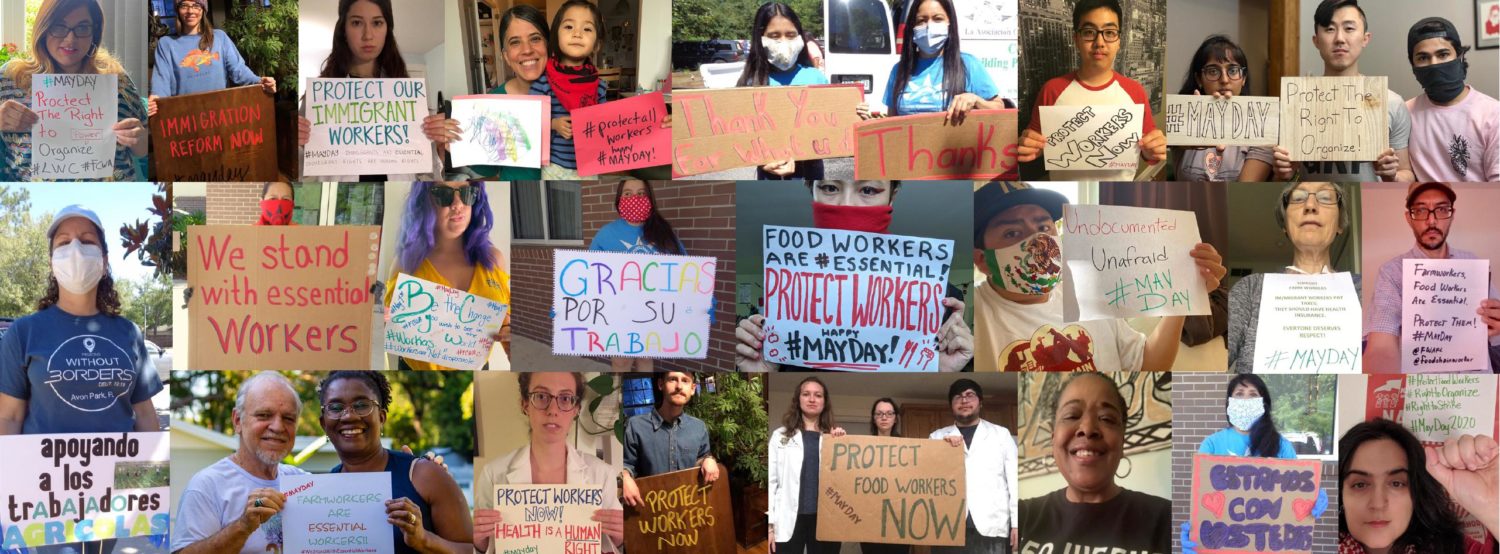Meat processing is one of the most dangerous jobs in the United States. It’s also notoriously underpaid and performed primarily by immigrants and people of color. In 2019, US plants employed some 200,000 people in direct meat processing jobs, at wages amounting to less than $30,000 per year. And the work is brutally hard. A key factor is line speeds: the faster the line, the greater the output and the higher the profits—and the greater the injuries. Line speeds have been on the rise for the past several years, spurred on by a revolving door of federal regulators with deep industry ties.
Both the pace and the organization of the work—with workers standing shoulder to shoulder— has left meat processing workers highly vulnerable to Covid-19. As of September 2020, some 43,000 meat packing workers have tested positive for the virus and over 200 have died as rural meat processing towns have become Covid-19 hotspots.
In our debut episode of Foodtopias, Axel Fuentes, executive director of Rural Community Workers Alliance in Milan, Missouri—home to a Smithfield pork plant—shares what it was like to work in this industry before Covid-19, what it’s like now, and how workers have been organizing since the early days of the pandemic for critical protections. Christina Spach, national organizer with Food Chain Workers Alliance, also joins us to talk national strategies.
Listen to Foodtopias Episode 1: Laboring in a Pandemic, and find more resources on how to support meat and other food worker organizing, below.
About the Guests
 Axel Fuentes is the Executive Director for Rural Community Workers Alliance, an organization focused on organizing food chain workers, educating on labor rights, and advocating for just immigration policies for Latinx and refugee workers. Rural Community Workers Alliance sprung out of the rural midwest to protect the rights of the most vulnerable demographic groups in the area, beginning in Milan, Missouri. RCWA seeks to address the root causes of the problems faced by its members, secure improved community health systems and services, and ensure workplace safety for food industry workers. The organization’s focus, mission, and initiatives are based on the knowledge and experiences of our workers and community members, and our actions are led by those most affected by them. RCWA is also a proud member of the Food Chain Workers Alliance, HEAL Food Alliance, and the US Food Sovereignty Alliance.
Axel Fuentes is the Executive Director for Rural Community Workers Alliance, an organization focused on organizing food chain workers, educating on labor rights, and advocating for just immigration policies for Latinx and refugee workers. Rural Community Workers Alliance sprung out of the rural midwest to protect the rights of the most vulnerable demographic groups in the area, beginning in Milan, Missouri. RCWA seeks to address the root causes of the problems faced by its members, secure improved community health systems and services, and ensure workplace safety for food industry workers. The organization’s focus, mission, and initiatives are based on the knowledge and experiences of our workers and community members, and our actions are led by those most affected by them. RCWA is also a proud member of the Food Chain Workers Alliance, HEAL Food Alliance, and the US Food Sovereignty Alliance.
 Christina Spach is a National Organizer for the Food Chain Workers Alliance, a coalition of worker-based groups whose members plant, harvest, process, pack, transport, prepare, serve, and sell food, organizing to improve wages and working conditions for all workers along the food chain. The Alliance works to build a more sustainable food system that respects workers’ rights, based on the principles of social, environmental, and racial justice, in which everyone has access to healthy and affordable food. Currently, FCWA has 31 members representing over 375,000 food workers in the United States and Canada.
Christina Spach is a National Organizer for the Food Chain Workers Alliance, a coalition of worker-based groups whose members plant, harvest, process, pack, transport, prepare, serve, and sell food, organizing to improve wages and working conditions for all workers along the food chain. The Alliance works to build a more sustainable food system that respects workers’ rights, based on the principles of social, environmental, and racial justice, in which everyone has access to healthy and affordable food. Currently, FCWA has 31 members representing over 375,000 food workers in the United States and Canada.
Dig Deeper
It’s Time for US Meatpackers to Stop Spreading COVID-19 and Racial Injustice by Axel Fuentes and Navina Khanna, Medium
Missouri Pork Plant Workers Say They Can’t Cover Mouths to Cough, The New York Times – On the lawsuit filed by workers against Smithfield claiming it failed to protect workers from coronavirus infection.
Worker advocates file meat plants discrimination complaint, Washington Post
With Trump Executive Order, Are Meat and Poultry Plants a COVID-19 Ticking Time Bomb? Union of Concerned Scientists
Revealed: Covid-19 outbreaks at meat-processing plants in US being kept quiet, The Guardian
Mapping Covid-19 outbreaks in the food system, Food & Environment Reporting Network
Take Action
Support the Rural Community Workers Alliance
Support the Food Chain Workers Alliance
Five things you can do to support food workers, Food Chain Workers Alliance
Food Workers are Not Disposable, Tell Congress: #ProtectAllWorkers, Food Chain Workers Alliance
Episode Credits
Host: Tanya Kerssen
Co-producers: Tanya Kerssen and Tiffani Patton
Editor: Asal Ehsanipour
Theme Music: “Set Me Free” by Will Magid
Logo & Design: Christina Bronsing-Lazalde




